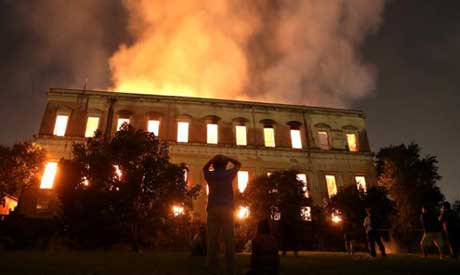International News
See other International News Articles
Title: 700-piece Egyptian collection at Brazil's National Museum destroyed: Initial report
Source:
Ahram Online
URL Source: http://english.ahram.org.eg/NewsCon ... -at-Brazils-National-Muse.aspx
Published: Sep 10, 2018
Author: Ahram Online
Post Date: 2018-09-10 09:31:17 by A K A Stone
Keywords: None
Views: 1038
Comments: 1
A massive fire swept through the museum, a former imperial palace, in Rio de Janeiro Sunday, destroying its collection of more than 20 million artifacts. "The fire spread to all the sections of the museum and destroyed all its content and destroyed the hall of Pharaonic artefacts, which contained 700 pieces," said Mostafa Waziri, secretary-general of Egypt's Supreme Council of Antiquities on Thursday. He cited Egypt's foreign ministry, which is following up on the matter with Egyptian consular and embassy officials in Brazil. The Egyptian artifacts included collectibles of Brazilian Emperor Pedro I, founder and first ruler of the Empire of Brazil, which he purchased in the 19th century from antiquities merchants. It also featured five mummies, one of which was kept in a sarcophagus and gifted by Egyptian Khedive Ismail to Brazilian Emperor Dom Pedro II during his visit to Egypt in the 19th century. The Egyptian Consulate in Brazil is in communication with the head of the museum's Egyptology department to identify the exact extent of the damage caused to the Egyptian pieces, Waziri said. Waziri earlier described the fire as "a great loss for humanity and world heritage." The oldest scientific institution in the country, the museum housed one of the largest anthropology and natural history and paleontology collections in the Americas. It was also home to the oldest human fossil found in Brazil, the 12,000-year-old fossil Luzia, and dinosaur bones. The cause of the fire is unknown, but Brazilian Minister of Culture Sergio Sa Leitao was quoted in Brazilian media as saying the blaze was likely caused by an electrical short-circuit or small paper-based hot air balloon landing on the roof.
 A preliminary report has revealed that the 700-piece ancient Egyptian collection at the National Museum of Brazil was destroyed in the fire that engulfed the 200-year-old building earlier this week, a senior Egyptian antiquities ministry official has said.
A preliminary report has revealed that the 700-piece ancient Egyptian collection at the National Museum of Brazil was destroyed in the fire that engulfed the 200-year-old building earlier this week, a senior Egyptian antiquities ministry official has said.
Post Comment Private Reply Ignore Thread
Top • Page Up • Full Thread • Page Down • Bottom/Latest
#1. To: A K A Stone (#0)
Just... wow...
Top • Page Up • Full Thread • Page Down • Bottom/Latest
[Home] [Headlines] [Latest Articles] [Latest Comments] [Post] [Mail] [Sign-in] [Setup] [Help] [Register]
